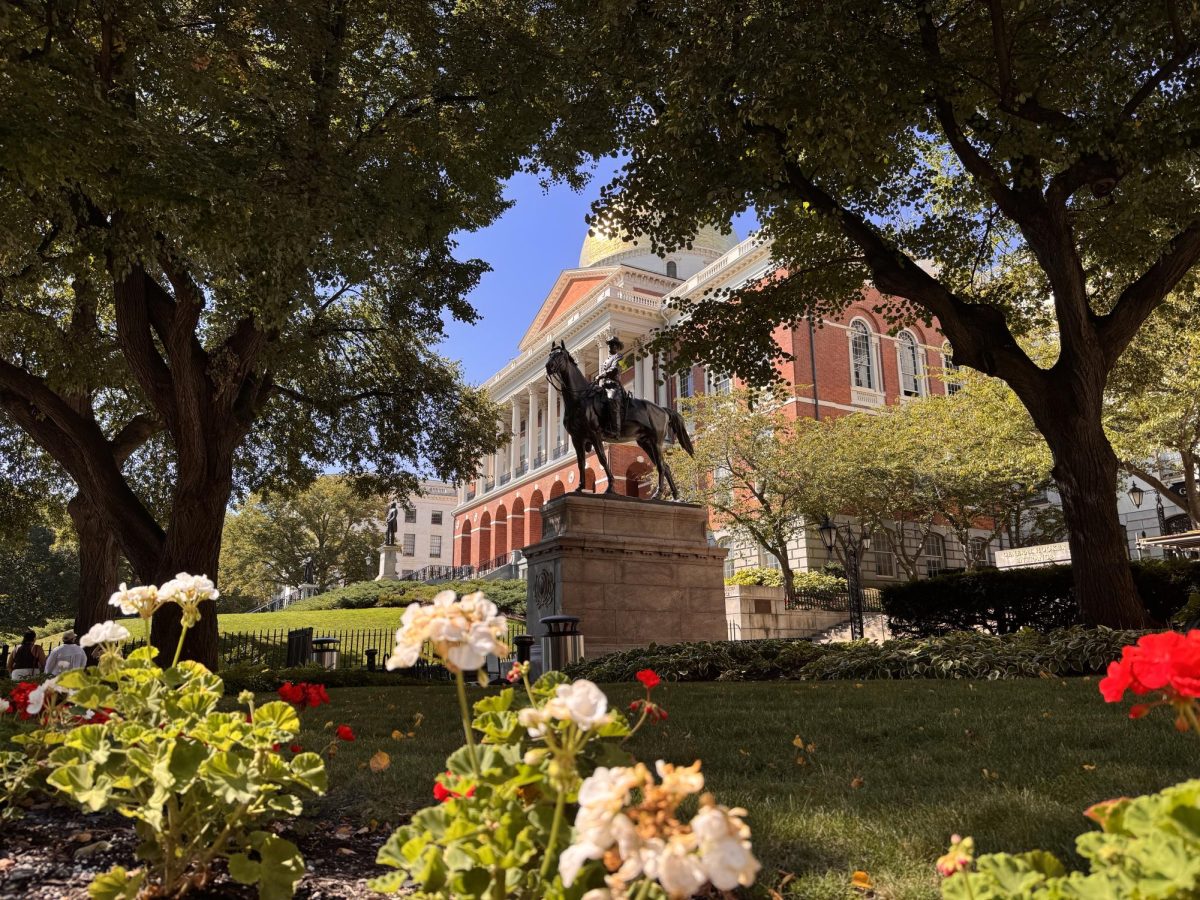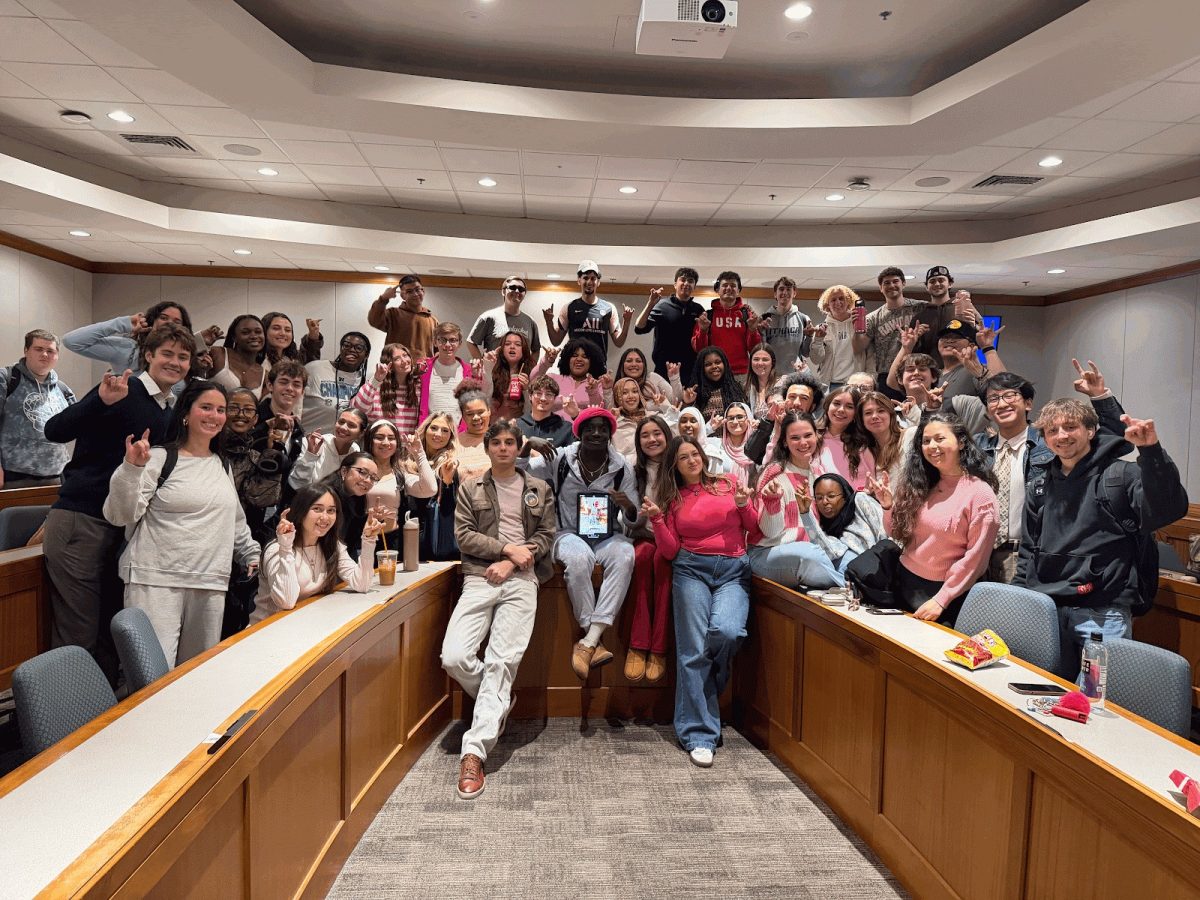Suffolk University’s Student Government Association brought a draft resolution supporting the faculty censure against the university president and the Board of Trustees chair to the floor at its second-to-last meeting of the year April 17.
This meeting marks the start of the resolution process, which takes two weeks. The first week includes making the resolution readily available to the members of the senate and then having the author, co-authors or sponsors of the resolution answer any questions or concerns the senate may have.
As one of the authors of the bill and next year’s SGA President Charlie Reyna-Demes took the stand. Other authors of the bill included members of the Academics Committee.
Reyna-Demes first gave a brief coverage of the bill, but advised the senate to read it for themselves for a more in depth understanding. He explained that this resolution was simply a show of support for the faculty of the university following their censure of university President Marisa Kelly and Board of Trustees Chairman Bob Lamb.
“Each time a faculty member loses their job, or has a benefit cut, or a program shuts down,the academics of our successors will be hurt,” said Reyna-Demes in his opening statement.
Reyna-Demes felt that this would be a “defining moment” for the senate in the upcoming year. This urging to support the faculty would fall in line with the values of forming a “student union” and raising complaints against the administration that he ran his presidential campaign on.
The floor was then opened up to questions from the senate, with the suspension of Robert’s Rules allowing the members to speak informally.
The first concern that arose about the resolution was about the number of faculty members who were spoken to who wanted SGA to show their support. Reyna-Demes said that the Academics Committee has a unique relationship with the faculty that allows them to gather information in regards to the faculty’s feelings about the situation.
Upon insistence from members of the Senate, Reyna-Demes agreed that they could draw up either a graph or solid numbers of faculty who wanted SGA’s support could be provided to go along with the resolution.
Current SGA President Clinton Oreofe brought up the fact that SGA could possibly face repercussions from the administration with whom they work so closely if they were to pass a resolution supporting the censure. He wanted to know what the benefits for both the faculty and SGA could be with a statement like this.
Reyna-Demes said that this is a fair line of thinking, but that SGA needs to prioritize the livelihoods of Suffolk educators over what the administration could do in response.
“I don’t think we should act on the basis of what [the administration] has given us versus the faculty,” said Reyna-Demes.
He called attention to the Mercer Benchmark study that Suffolk participated in 2022, in which the university compares itself to similar universities across the nation. In that study it was found “Suffolk faculty salaries lag substantially behind those of our peer institutions,” as stated in the faculty’s resolution.
In 2022, the economics department also did a study to see what kind of salary increase they would need to keep up with inflation, accounting for the cost of living and the like. According to Reyna-Demes, the study found that faculty needed a 10% raise and, in turn, what they got from the administration was 2% or a flat rate of $100,
Oreofe also had concerns about the Suffolk administration no longer wanting to provide assistance to SGA, a rapport or “leverage” he has seen be built over his four years as a member of SGA.
Reyna-Demes said he feels that SGA does not have “leverage” with the administration as Oreofe thinks they do, but rather simply a good relationship. Reyna-Demes said that it would be “immature” of the administration to respond in such a manner as refusing to continue a relationship with SGA.
“I trust the people who have been losing their jobs and benefits and decided to censure their boss rather than the answers the administration has given us,” said Reyna-Demes.
Reyna-Demes cited the closure of the Madrid campus as an example of the administration working around the faculty. Within Suffolk’s constitution, the school cannot close a campus without consulting the faculty. When it came to the Madrid campus, the university renamed it to a Madrid “location” as a workaround, according to Reyna-Demes.
Within the resolution were examples of how the number of students and the number of faculty members has fluctuated over the years, which was brought into discussion on the Senate floor. Particularly, if the inclusion of these numbers was significant.
In 2023, 57 faculty members and 12 part-time faculty members were laid off, according to Reyna-Demes. Additionally, in just this year alone, there was a 282 drop in full-time students, with 122 of them being undergrad students.
Though, since 2020, there has been a bump of 16 students in the undergrad population, but Reyna-Demes felt it was not a “signal of growth” for the university, which was the reason for including it within the resolution.
Many concerns circled back to how the faculty censure has to do with SGA, as it is a student-led organization that works for the students. Reyna-Demes argued that within the resolution were explanations for how the educators being affected could lead to a snowball effect for the students.
One of these snowball effects could possibly be a strike from the faculty if they don’t feel supported by the university. Additionally, Reyna-Demes said a subpar education could be another consequence the students could face if they don’t stand with the professors.
There were also questions of how the resolution will support faculty and what change it could bring about, if any. Reyna-Demes felt that SGA was limited in certain ways as a student body, which makes a statement of support the best the organization can do at the moment. He also offered that if the Senate felt they needed to make a more forward stance, they could do so at a later date and that this was a “baby step.”
Isabella Tencer, a class senator for 2025, a member of the Academic Committee and a co-author of the resolution, told the senate that those writing the resolution found that student retention was declining due to closure of departments and students feeling like they were not receiving the education they felt was worth what they paid for. They also found that the lack of faculty retention was directly affecting student retention, Tencer told the Senate.
Joey Pisani, class of 2028 and the upcoming 2025-2026 General Senator-at-Large, brought up the amount of connections and mentors that are being lost with the faculty and how that will affect the students. He also noted that the faculty most likely had similar concerns to SGA about the repercussions from the administration and that they didn’t make the decision to censure Kelly “lightly.”
“Our support of them is going to have a ripple effect on how much they are able to support and provide their services to us,” said Pisani.






















